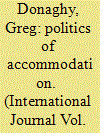|
|
|
Sort Order |
|
|
|
Items / Page
|
|
|
|
|
|
|
| Srl | Item |
| 1 |
ID:
178198


|
|
|
|
|
| Summary/Abstract |
“Strategic culture” is one of those conceptual bridges that link history with political science because, among other reasons, it reminds us of the hold that memories of past events can continue to exercise upon contemporary reality. But those memories are always subjective, sometimes downplayed to the point of nearly being forgotten altogether, at other times so overstated as to yield a highly distorted sense of the past and of its relationship to the present. This article constitutes a revisitation of contemporary Quebec strategic culture, from the perspective of historical memory. That strategic culture has of late been so strongly stamped with the impress of a “Pearsonian internationalism” that it becomes easy for analysts to confuse it with “pacifism.” Yet it has also been a strategic culture that stems from a great deal of historical amnesia. What has been effaced from the collective memory is the long period in which war was endemic in New France—the period that gives the lie to the notion of Quebeckers somehow being a “pacifistic” folk. This was the sanguinary era upon which the historian Francis Parkman focused such a large share of his prodigious intellectual energies. Only the closing act of this era seems to have escaped erasure from Quebec’s collective memory. Indeed, that act, which took place on the Plains of Abraham, has been “remembered” only too well. So well has it been recollected, in fact, that it has fostered within Quebec society the unshakable conviction that, for Quebeckers, war must always be a risky undertaking susceptible of leading to catastrophe.
|
|
|
|
|
|
|
|
|
|
|
|
|
|
|
|
| 2 |
ID:
146498


|
|
|
|
|
| Summary/Abstract |
This paper re-examines Canada’s response to the Suez Crisis within the context of its overall approach to the Middle East in the early 1950s. It reminds contemporary readers that most Canadian policymakers, including Prime Minister Louis St. Laurent and his Secretary of State for External Affairs, Lester B. Pearson, viewed the distant and unfamiliar region with reserve, as one better left to the Great Powers to sort out. That view only changed in 1956, when the Suez Crisis, Anglo-American discord, and the possibility of nuclear war threatened Canadian strategic interests, transforming Canada into a small regional stakeholder.
|
|
|
|
|
|
|
|
|
|
|
|
|
|
|
|
|
|
|
|
|